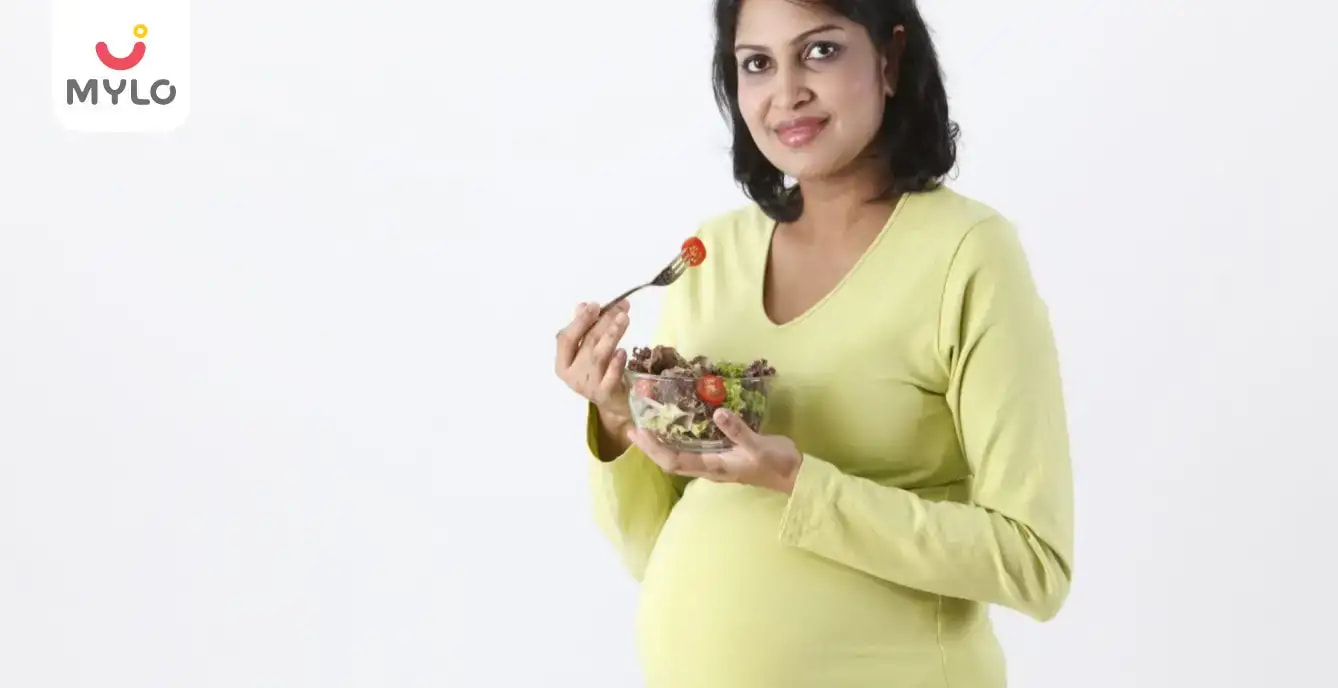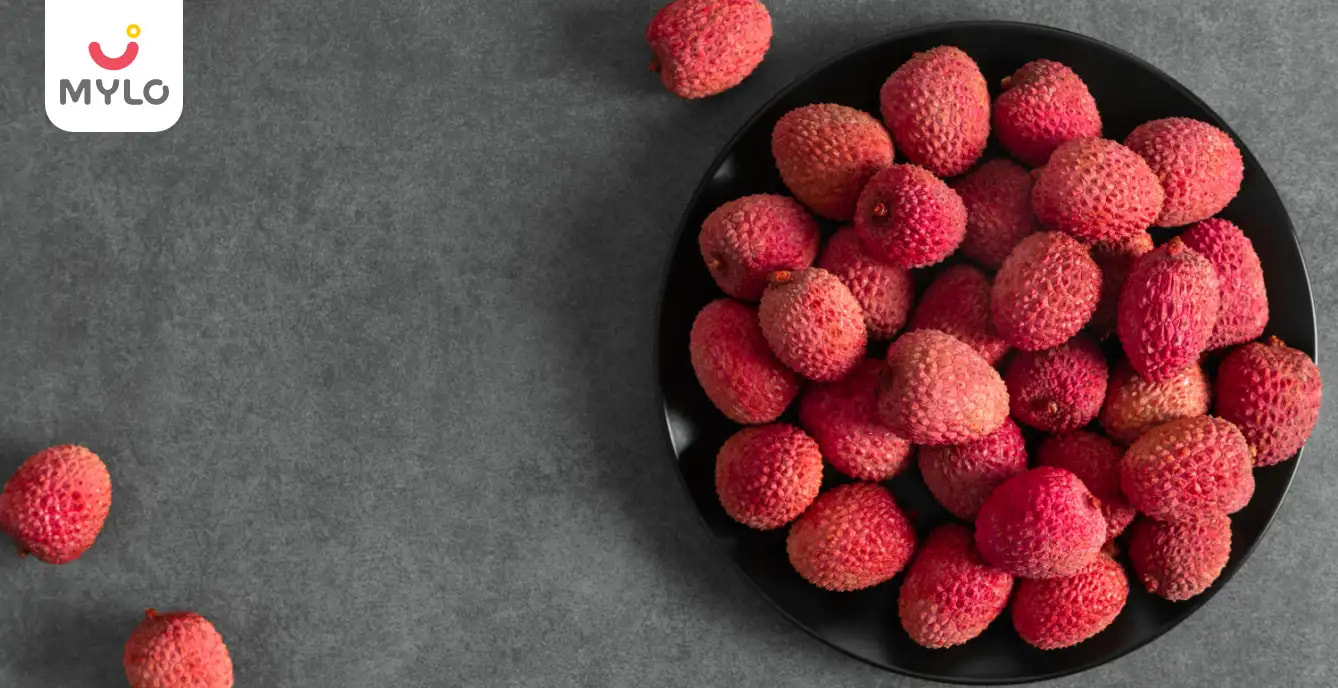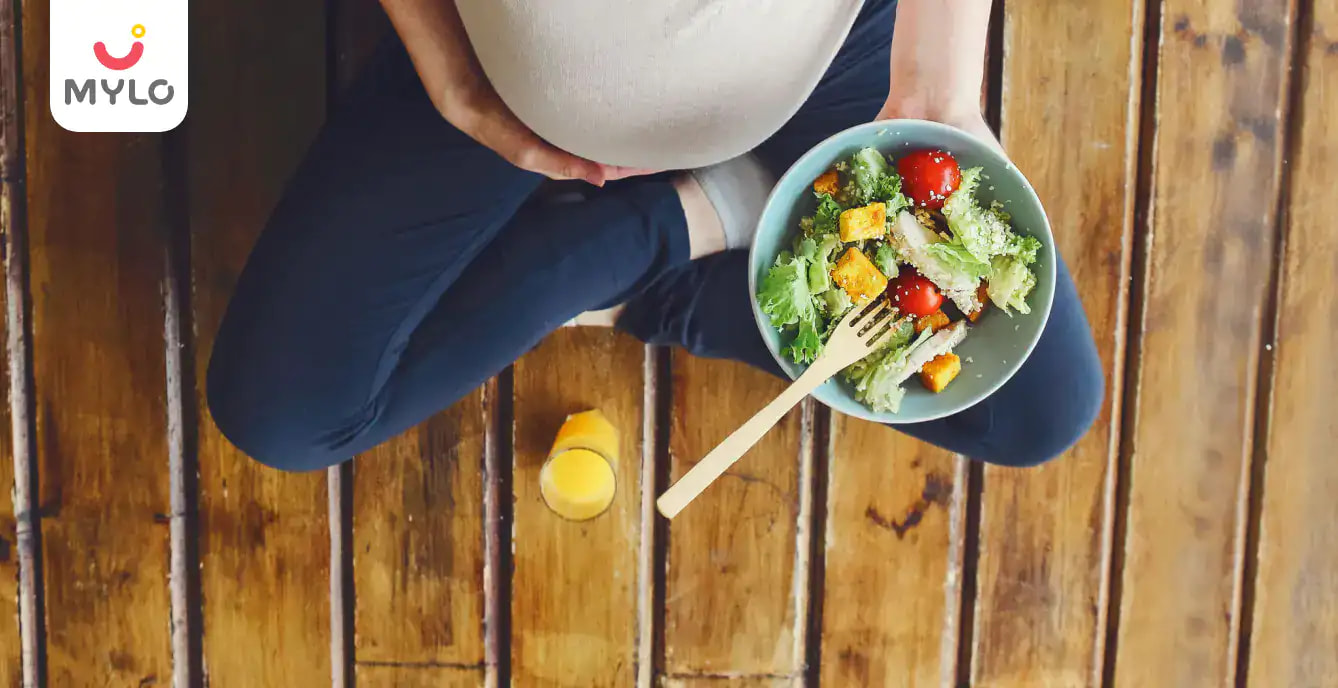Home

Diet & Nutrition

What Is The Best Thing For Pregnant Women To Eat?
In this Article

Diet & Nutrition
What Is The Best Thing For Pregnant Women To Eat?
Updated on 3 November 2023
During pregnancy, proper nutrition is more important than ever in supporting a healthy pregnancy and the baby's overall development. The basic principles of healthy eating include consuming plenty of fruits, vegetables, grains, lean protein and healthy fats. However, when it comes to the best foods to eat while pregnant, try to reach for things with plenty of nutrients in just a few bites and not too much in the way of empty calories. Limit foods and beverages with added sugars, saturated fat and sodium content. Also, make sure that at every meal, half your plate is filled with fruits and vegetables. As optimal nutrition can help women meet the increased physical demands of pregnancy and help develop the fetus, having a healthy diet is crucial during pregnancy.
Best Foods For Pregnancy
There are various foods to eat while pregnant. However, the following few are pregnancy super foods to consider:
-
Eggs
Eggs are a great source of protein and a vital part of your pregnancy diet. Proteins are made up of amino acids, the building blocks of the cells in your body and your baby's. Eggs also contain vitamins and minerals, including choline which is contained mainly in the yolks. Choline helps develop the baby's brain and spinal cord and helps prevent specific congenital disabilities.
-
Dairy Products
You require extra protein and calcium during pregnancy to meet the requirements of your growing little one. Hence, it is essential to include milk, cheese and yoghurt in your diet. Dairy products include two types of high-quality protein, casein and whey. Dairy products are the best calcium source and provide high amounts of phosphorus, vitamin B, magnesium and zinc.
-
Salmon
Salmon is an excellent source of Omega 3 fatty acids, which are crucial for developing your baby's brain and may even boost your mind. Salmon also provides protein and vitamin D, essential for your baby's bones and teeth. Salmon is a low-mercury choice for eight to twelve ounces of seafood and is safe for pregnant women to consume each week.
-
Beans
Beans, including legumes like lentils, peas and peanuts, are excellent sources of protein, iron, folate, potassium and magnesium. Beans are also a great source of fibre and help prevent and alleviate common pregnancy discomforts, such as constipation and haemorrhoids. These are essential when you are pregnant.
-
Sweet potatoes
Sweet potatoes obtain their orange colour from carotenoids, plant pigments that are converted into vitamin A in our bodies. Vitamin A is required for healthy bones, lungs, eyes and skin development of the baby. This sweet vegetable is also a great source of vitamin C, manganese, and vitamin B6, which may help with morning sickness. It also has potassium and fibre content.
-
Whole grains
Whole grains are high in fibre and nutrients, such as vitamins, iron, folic acid, magnesium, the antioxidant vitamin E, and the mineral selenium. They also contain phytonutrients, a plant-based compound that protects cells. Try to include different kinds of whole grains in your pregnancy diet, such as barley, buckwheat, oats, and maise.
-
Walnuts
Walnuts are one of the abundant sources of plant-based omega-3s. They are also a great source of magnesium, fibre and protein, so grab a handful of walnuts for an on-the-run snack or toss some into your salad. You can also consume other nuts, like almonds, pistachios, nuts and seed butter like tahini, for similar benefits.
-
Greek yoghurt
Greek yoghurt has twice the protein of regular yoghurt. Also, it's a tremendous source of probiotics, vitamin B, phosphorus and calcium. Calcium helps to keep your bones strong and also assists your baby in developing a healthy skeleton. Yoghurt is a versatile breakfast ingredient which can be added to savoury dishes too. Another suitable means to get calcium every day is by consuming milk.
-
Broccoli and dark leafy vegetables
Broccoli and dark leafy vegetables such as spinach, kale, and swiss chard are prenatal superfoods packed with vitamins and nutrients, including vitamins A, C, and K, as well as calcium, iron, and folate. They are also rich in antioxidants and fibre, which helps ease constipation. It is easy to include dark leafy greens in your diet just by chopping them coarsely and tossing them into smoothies, soups, stir-fries and omelettes.
-
Lean meats and poultry
Meat is an excellent source of high-quality protein and a rich source of vitamin B, iron and zinc. Iron is essential to produce haemoglobin, and you require more of it during pregnancy, particularly in your third trimester. Low iron levels during early and mid-pregnancy could lead to iron deficiency anaemia, which increases the risk of low birth weight and other applications. It can be hard to cover your iron requirements with meals alone, especially if you are a vegetarian or vegan. Hence combining foods that are rich in vitamin C, such as oranges and bell peppers, along with iron-rich foods, may help to increase absorption. Include cuts around 95 to 98 per cent fat-free. Unless they are heated until steaming hot, skip deli meats and hot dogs, as there is a small risk of infection from bacteria and parasites such as listeria, toxoplasma, or salmonella, which could be dangerous during pregnancy for you and your baby.
-
Colourful fruits and veggies
Consuming plenty of green, red, orange, yellow, and purple fruits and vegetables helps you and your baby receive various nutrients. Each colour group has different vitamins and minerals. For example, bell peppers are high in vitamin C, which helps to absorb iron, while berries are abundant in antioxidants and are considered the best fruit to eat during pregnancy. Vegetables have also been linked to reducing the risk of low birth weight among infants. Salads are an effective means to combine colourful fruits and veggies.
-
Avocados
Avocados are rich in monounsaturated fatty acids, which help develop your baby's skin and brain. They are also rich in vitamin K, antioxidants and folate, which help to prevent specific congenital disabilities. The potassium content in avocados helps to relieve leg cramps. Also, fibre content is an antidote to prevent constipation. The vitamin B6 in avocados can help ease nausea and is also suitable for your baby developing brain.
-
Dried fruit
Portable and nutrient-dense, dried fruit offers an occasionally good alternative to fresh fruit, which is essential in your pregnancy diet. Try to look for dried fruit without added sugar. Depending on the variety of dried fruit you choose, you can boost your diet with various vitamins and minerals like iron, as well as antioxidants and fibre. For example, prunes are a tried and proper remedy for constipation that plagues many pregnant women.
-
Water
We all require water to stay hydrated, especially pregnant women. Blood volume increases by about 45 per cent during pregnancy. So it is essential to drink at least eight to ten glasses of water daily since it is crucial in delivering nutrients to your baby and helps to produce new cells. Also, drinking enough water during pregnancy is one of the best ways to avoid constipation since dehydration can increase the risk of preterm labour.
Foods To Avoid During Pregnancy
Like there are best to eat during pregnancy, remember that there are some foods to avoid. Some foods are more likely to harbour bacteria or chemicals that could make you sick. Some foods to avoid when pregnant are as follows.
-
Avoid seafood that contains mercury, such as shark, swordfish and marlin or limit the intake to an absolute minimum.
-
Avoid uncooked or partially cooked meats and consume thoroughly cooked meats.
-
Avoid uncooked shellfish due to the risk of bacterial or viral contamination, which can cause food poisoning
-
Avoid raw eggs and any foods that contain them.
-
Avoid Soft, ripened cheese such as brie and camembert, as they risk Listeria contamination. Listeria is a bacteria that could cause potentially fatal infections in pregnant women and their babies.
Supplements
Pregnant women require more of almost all water and fat-soluble nutrients. Therefore, doctors recommend prenatal supplements before, during and after pregnancy to support health and recovery. A well-rounded prenatal supplement contains all the essential nutrients, which include:
-
Folate
According to the World Health Organization, pregnant women should consume 400 mcg of folic acid per day up to the 12th week of pregnancy.
-
Iron
A pregnant woman should consume 27 mg of iron per day. Most women can obtain it through a healthy diet.
-
Vitamin D
Some studies estimate that 18-24% of pregnant women worldwide suffer from vitamin D deficiency. A pregnant woman requires 15 mcg of vitamin D daily.
-
Zinc
Consuming zinc supplements during pregnancy may slightly reduce the risk of preterm birth. A pregnant woman requires 11-12 mcg of zinc.
-
Choline
Choline is essential for the health of pregnant women and their babies. Studies show that most pregnant women do not get the recommended 450 mg of choline daily since many prenatal vitamins do not contain it. Hence it is crucial to consume eggs and shitake mushrooms which contain a high amount of choline.
-
Vitamin A
Vitamin A or retinol is crucial for health during pregnancy. Pregnant women should consume 750-770 mcg of vitamin A or retinol activity equivalents(RAE). Vitamin A occurs in many forms. RAE measures the relative amount of vitamins in these varied forms. One RAE is equivalent to 1 mcg of retinol or 12 mcg of beta carotene from food, two mcg of beta carotene from supplements, or 3.33 IU of vitamin A.
-
Omega-3s
Omega-3s are essential for natal development and a woman's overall health during pregnancy. Increasing the intake of omega-3 polyunsaturated fatty acids during pregnancy may reduce the risk of preterm birth.
Tips For A Healthy Pregnancy Diet
-
Pregnant women require lots of protein, healthy fats, and more specific vitamins and minerals such as folic acid, iron and calcium.
-
Eating adequately during pregnancy doesn't mean consuming a lot more. You don't require additional calories during the first trimester if you start at a healthy weight. You'll require about 350 extra calories a day during the second and about 450 extra calories during the third trimesters.
-
Some foods could be dangerous during pregnancy, so try to avoid them. Also, limit your caffeine intake and avoid alcohol during pregnancy.
-
Healthy pregnancy snacks should help meet your nutritional needs and try to avoid processed foods, packaged foods, and sugary desserts.
-
If nausea, food versions, heartburn, or indigestion make consuming full-size meals uneasy, try eating small, frequent meals throughout the day. As your pregnancy processes and your baby grows, it may crowd your stomach and digestive organs, leading to less space in your body for big meals.
-
Also, you can create a pregnancy meal plan that will help you get what you require from your pregnancy diet.
You may also like:
Should Pregnant Women Completely Stop Drinking Alcohol?
There is no safe amount of alcohol during pregnancy, so it is better to avoid it altogether. Alcohol in the blood passes down to the foetus through the umbilical cord, and too much exposure to alcohol could undermine fetal development. Also, there is a risk that the baby may acquire a fetal alcohol spectrum disorder, which can result in vision or hearing problems, issues with attention, and low birth weight, among other complications.
Should Pregnant Women Avoid Caffeine?
Drinking excessive caffeine during pregnancy is linked to an increased risk of miscarriage, fetal development disorders, and low birth weight. A caffeine intake as low as 100-200 mg per day could negatively affect fetal development. However, the underlying reasons for this problem remain unclear. Also, various foods and drinks besides coffee contain caffeine, including sodas, energy drinks, chocolate and teas. Some cold and flu medications also contain caffeine. A doctor can provide more information regarding which medicines are safe during pregnancy.
Conclusion
Pregnancy increases the physical demands of the body to stay healthy. Your growing baby requires all those nutrient-dense foods from a well-rounded diet of whole grains, fruits and veggies, lean proteins and healthy fats. A pregnancy diet should also contain optimal protein intake from plant and animal sources such as fish, chicken, eggs and lentils. It should also include fibre-rich carbohydrates from oats, sweet potatoes and fruits and healthy fats from sources such as avocados, nuts, seeds, and yoghurt. There's a world of delicious options to choose from, which could provide your baby with everything it needs. Also, keep your doctor informed about your eating choices and let them guide you on a diet with the necessary supplements.
You may also like: https://mylofamily.com/article/healthy-pregnancy-food-87636?



Written by
khushboo jain
Get baby's diet chart, and growth tips

Related Articles
Related Topics
RECENTLY PUBLISHED ARTICLES
our most recent articles

Diet & Nutrition
গর্ভাবস্থায় আলুবোখরা: উপকারিতা ও ঝুঁকি | Prunes During Pregnancy: Benefits & Risks in Bengali

Diet & Nutrition
গর্ভাবস্থায় হিং | ঝুঁকি, সুবিধা এবং অন্যান্য চিকিৎসা | Hing During Pregnancy | Risks, Benefits & Other Treatments in Bengali

Women Specific Issues
স্তনের উপর সাদা দাগ: লক্ষণ, কারণ এবং চিকিৎসা | White Spots on Nipple: Causes, Symptoms, and Treatments in Bengali

Diet & Nutrition
গর্ভাবস্থায় পোহা: উপকারিতা, ধরণ এবং রেসিপি | Poha During Pregnancy: Benefits, Types & Recipes in Bengali

Diet & Nutrition
গর্ভাবস্থায় মাছ: উপকারিতা এবং ঝুঁকি | Fish In Pregnancy: Benefits and Risks in Bengali

Diet & Nutrition
গর্ভাবস্থায় রেড ওয়াইন: পার্শ্ব প্রতিক্রিয়া এবং নির্দেশিকা | Red Wine During Pregnancy: Side Effects & Guidelines in Bengali
- ইনার থাই চ্যাফিং: কারণ, উপসর্গ এবং চিকিৎসা | Inner Thigh Chafing: Causes, Symptoms & Treatment in Bengali
- গর্ভাবস্থায় ব্রাউন রাইস: উপকারিতা ও সতর্কতা | Brown Rice During Pregnancy: Benefits & Precautions in Bengali
- Velamentous Cord Insertion - Precautions, Results & Safety
- Unlock the Secret to Flawless Skin: 7 Must-Have Qualities in a Face Serum
- Unlock the Secret to Radiant Skin: How Vitamin C Serum Can Transform Your Complexion
- Gender No Bar: 10 Reasons Why Everyone Needs a Body Lotion
- Unlock the Secret to Radiant Skin How to Choose the Perfect Body Lotion for Your Skin Type
- Top 10 Reasons to Apply a Body Lotion After Every Bath
- Communication in Toddlers: Milestones & Activities
- How to Improve Vocabulary for Toddlers?
- A Comprehensive Guide to Understanding Placenta Accreta
- Vulvovaginitis in Toddlers Causes, Symptoms and Treatment
- A Comprehensive Guide to Understanding Cerebral Palsy in Children
- Bitter Taste in Mouth During Pregnancy: Understanding the Causes and Remedies


AWARDS AND RECOGNITION

Mylo wins Forbes D2C Disruptor award

Mylo wins The Economic Times Promising Brands 2022
AS SEEN IN

- Mylo Care: Effective and science-backed personal care and wellness solutions for a joyful you.
- Mylo Baby: Science-backed, gentle and effective personal care & hygiene range for your little one.
- Mylo Community: Trusted and empathetic community of 10mn+ parents and experts.
Product Categories
Baby Carrier | Baby Soap | Baby Wipes | Stretch Marks Cream | Baby Cream | Baby Shampoo | Baby Massage Oil | Baby Hair Oil | Stretch Marks Oil | Baby Body Wash | Baby Powder | Baby Lotion | Diaper Rash Cream | Newborn Diapers | Teether | Baby Kajal | Baby Diapers Pants | Cloth Diapers | Laundry Detergent | Lactation Granules |








